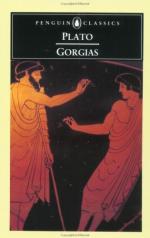|
This section contains 884 words (approx. 3 pages at 400 words per page) |

|
Chapter III (470-479) Summary and Analysis
Socrates is against tyranny, which involves power to do anything one pleases. Tyrannic power allows for destruction, but such power has little to do with greatness. Power to destroy requires punishment. As Polus indicates, punishment is the result of destructive actions. Punishment in itself is a negative action, although some negative actions may be considered positive.
For Socrates, just actions are better that unjust as they lead to happiness. Polus thinks that even those who commit injustice are happy, and argues that even a king such as Archelaus is happy despite committing many crimes. Socrates maintains that such an argument is not valid as there is no statement here that leads to the truth. As the consequence of wrongdoing is punishment, it is impossible to be happy when being unjust. Wrongdoers are even more wretched when they...
(read more from the Chapter III (470-479) Summary)
|
This section contains 884 words (approx. 3 pages at 400 words per page) |

|




